米教員への経済講義: Economics Lecture to US Teachers [Report]
フルブライト・メモリアル基金のプログラム: FMF Program
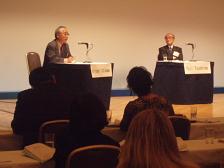
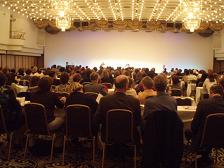
政治を講義する市川博也教授・津島雄二議員と参加した米教員
Prof. Ichikawa and Mr. Tsushima Lecturing in Politics to Teachers
11月16日@京王プラザホテル: November 16 @Keio Plaza Hotel
経済についての講義要旨: Economics Lecture Summary
宮尾尊弘 国際大学教授: IUJ Professor Takahiro Miyao
「安倍政権の経済課題:イノベーションと再挑戦」
安倍政権の経済政策課題は、経済を再成長させるとともに個人には再挑戦させることで、そのためにイノベーションと教育・訓練が強調されている。問題はどうしたらイノベーションを活発化できるか、また教育や訓練で若者を再挑戦させることができるのかどうかということである。
以下の英文で詳しく論じるが、より基本的な問題は日本全体としても、若者としても、どうしたらよりよい生活のために積極的にリスクをとるようなチャレンジ精神を育成するかということである。このことがイノベーション、新産業創造、雇用創出、投資・消費促進をもたらし、ひいてはより高い成長にむすびつくであろう。
安倍首相がこの点に気づいて何か手を打つかどうかがポイントといえる。
"PM Abe's Economic Agenda: Innovation and Challenge"
Prime Minister Abe's Economic Policy Agenda may be summarized as "the economy grow again and individuals try again," that is, to achieve higher economic growth and to give a better chance for individual success, where innovation and education/training are emphasized for those purposes.
First of all, why economic growth? In reality, the Japanese economy is now growing again after the "lost decade" and a half (15 years) of stagnation. At the same time, higher growth is necessary for the sake of dealing with a number of serious economic problems such as (1) the government's huge budget deficit, (2) increasing social security burden and (3) future tax hikes in the aging, low-birthrate economy.
The question is how to achieve higher growth. Abe seems to be a supply-sider, emphasizing supply-side factors such as innovation, technology, investment, etc., but not mentioning any demand-side factor at all. A related question is how to accelerate innovation. It is well known that innovation is up to the private sector and is something the government cannot manipulate. Most likely Mr. Abe himself does not know how to do it and how to spur new venture-type business in Japan.
As for better chance for individual success, the issue is a widening gap between the rich and the poor in Japan. This is partly due to severe market competition on the global scale, but partly due to the lack of challenge spirit on the part of some young people: there are now so many NEET (people Not in Education, Employment or Training) and Freeters (living on short-term temporary jobs) in Japan.
Why is this a problem? The widening rich/poor gap might be used as a pretext for opposition to reform. Also an increasing number of non-working youth may well become an obstacle to growth due to the lack of skilled work force as well as the fiscal burden to provide social security to them, especially to those who might be called "elderly NEET." Here Mr. Abe's policy priority seems to be placed on the NEET/Freeter issue.
Then how to reduce NEET/Freeters? There is no easy solution, but the government will try to offer job counseling/training for them to find regular jobs, while business itself is to create more regular jobs and give on-the-job training to young people. And they themselves should learn more basic skills, especially math and science. But the question will remain as to whether young people would "try again" once they fail in education, employment or training.
In this connection, a more fundamental socio-economic issue is how to foster "challenge spirit," especially among young people to take risk for a better life in Japan. Such attitude will certainly affect the outcome of innovation and new business, and thus the speed of job creation. Willingness to take risk will lead to more investment and more consumption, contributing to higher growth. Hopefully, Prime Minister Abe can realize this and do something about it.
経済教育ワークショップ(2日目):Economic Education Workshop (Day 2) [Report]
「経済教育ネットワーク」が東京でワークショップ開催(2日目:11/12)
"Network for Economic Education" Workshop in Tokyo (Day 2: 11/12)
参加者:中高校の教員中心に約20名
Participants: About 20 middle/high school teachers & specialists
プログラム: Program:
9:30-11:00 「学」と「産」からの提言: Ideas from Academia and Business
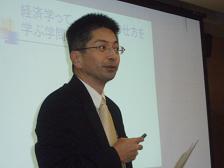
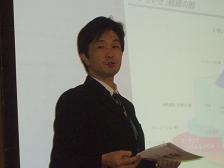
「学」の大竹文雄氏(Fumio Otake)と「産」の浅野雅樹(Masaki Asano)
11:15-12:00 経済時事問題解説:Key Words in Economic News
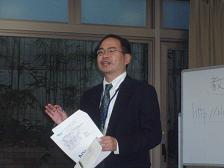
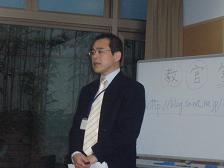
司会の野間敏克氏(T. Noma)とプレゼンする熊谷直次氏(Naoji Kumagai)
13:00-15:00 実践報告: Class Practice Reports
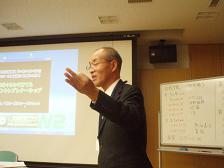
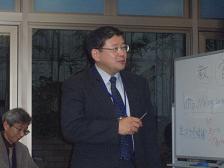
丹松美代志氏(Miyoshi Tanmatsu)と川瀬雅之氏(Masayuki. Kawase)
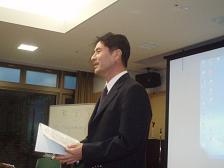
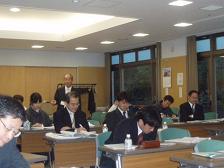
河原和之氏(Kazuyuki Kawahara)と会場風景(Audience)
15:00-16:30 全体討論と閉会挨拶:Open Discussion & Conclusion
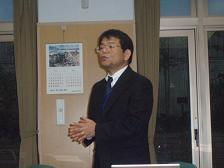
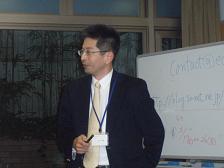
総括する猪瀬武則氏(T. Inose)と閉会の挨拶をする大竹文雄氏(F. Otake)
ワークショップ(2日目)内容要旨:
経済教育ワークショップ2日目は、最初のセッションで「学」と「産」の側からの授業に関するアイデアの提案があった。まず大竹文雄氏(大阪大学)が、中高生に対する経済学教育として「無駄を作らない方法」と「真面目に働く仕組み」を教えること、また仕事と給料について考えさせることが生徒の興味を引くために有効であると指摘。それに続いて浅野雅樹氏(野村総研)が、企業の期待する人材教育では「コミュニケーション・スキル」を重視するとともに、人を動機づけるものとして「ビジョン」や「ミッション」にも注目すべきであることが示唆された。
それに続くセッション「経済時事問題解説」では、熊谷直次氏(野村総研)が、「企業の社会的責任」というキーワードを詳しく解説し、現代の日本ではそれが多面的な意味をもっていることを示した。質疑応答では、そのように「企業の社会的責任」を広く解釈することの是非、および「学校の社会的責任」とは何かといった問題が議論された。
午後最初のセッション「実践報告」のセッションでは、実際に中高校の教育に携っている3人の体験談が報告された。(1)丹松美代志氏(池田市立細河中)は「職場体験学習」として生徒が商店街の活性化をサポートする様々な取組みを中心に報告。(2)川瀬雅之氏(札幌市立旭丘高)は教師のチーム・ティーチングによって中学生には身近な体験を、また高校生には興味のある出来事に基づいた実践によって「消費者教育」を行なった事例を報告。(3)河原和之氏(東大阪市教育センター)は生徒が経験や生活に根ざした興味の持てる学習テーマを具体的に取り上げ解説し、ビデオで実際の授業を提示。
そして最後の「全体討論」では、猪瀬武則氏(弘前大)が総括として問題の整理を行い、その後参加者が今回のワークショップから学んだものなど感想を述べ合った。閉会挨拶では、大竹文雄氏(大阪大)が、経済教育ネットワークの役割りについて、問題意識の共有、実践的知識の共有、教材開発、人的な交流・連携、ネットでの情報交換を強調し、今後の方向性を示して閉会した。
ワークショップ全体のプログラム詳細は以下を参照:
http://www.econ-edu.net/modules/news2/article.php?storyid=8
Workshop (Day 2) Summary:
In the first session of the second day, there were some teaching ideas presented from academia and business. Mr. Fumio Otake (Osaka Univ.) pointed out that "methods to avoid waste"and "systems to make people work diligently" should be taught in economic education for middle/high school students, and to study jobs and salaries might be quite effective in attracting students' attention. And Mr. Masaki Asano (Nomura Research Institute) emphasized "communication skills" as a key element for human resource development in business as well as "visions" and "missions" as motivating factors for future prospects.
In the next session "Key Words in Economic News," Mr. Naoji Kumagai (Nomura Research Institute) explained the word "CSR" (Corporate Social Responsibility) with multiple meanings in various dimensions in Japan. Afterwards, some questions were raised as to whether the definition of CSR in Japan is too wide and what "School Social Responsibility" would mean.
In the afternoon session "Class Practice Reports," three teachers presented their practice in class: (1) Mr. Miyoshi Tanmatsu (Ikeda-shi Hosokawa Middle School) reported on students' activities to help revitalize their neighborhood business district as part of a "Business Practice Course." (2) Mr. Masayuki Kawase (Sapporo-shi Asahigaoka High School) explained a "Consumer Education Course" with team teaching to develop appropriate teaching materials for middle and high school students based on their experience and/or their interest. (3) Mr. Kazuyuki Kawahara (Higashi Osaka-shi Education Center) took up a number of topics that interest students as daily affairs in their real life, and explained how to motivate students to learn in class by showing a video on his actual classes.
In the final session "Open Discussion," Mr. Takenori Inose (Hirosaki Univ.) summarized various issues discussed regarding economic eductaion, and many participants expressed their appreciation for information exchange and human interaction at the two-day workshop. Then, Mr. Fumio Otake (Osaka Univ.) gave the closing address, in which he emphasized the role of the Network for Economic Education for problem sharing, practical knowledge sharing, teaching material development, online and offline information exchange, etc., leading to future prospects for the Network.
For a detailed program on the two-day workshop, see the following;
http://202.164.252.34/blog/2006/09/announcement.html
経済教育ワークショップ (1日目):Economic Education Workshop (Day 1) [Report]
「経済教育ネットワーク」が東京でワークショップ開催(1日目:11/11)
"Network for Economic Education" holds a workshop in Tokyo (Day1: 11/11)
参加者:中高校の教員中心に約30名
Participants: About 30 middle/high school teachers & specialists
プログラム: Program:
9:45-10:00 挨拶: Opening Address
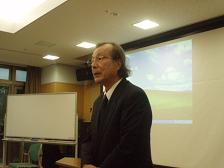
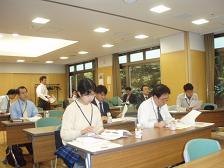
挨拶する篠原総一氏(Soichi Shinohara)と会場の風景(Participants)
10:00-12:00 経済の授業内容:Economics Course Content
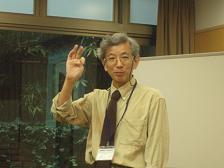
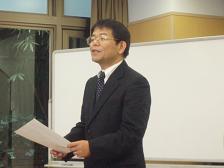
プレゼンする新井明氏(Akira Arai)とコメントする猪瀬武則氏(Takenori Inose)
13:00-15:30 モデル授業:シミュレーション: Model Lecture: Simulation
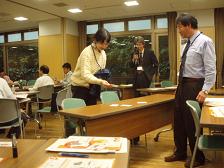
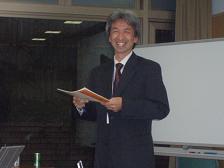
活動型授業をする三枝利多氏(T. Saegusa)とコメントする藤井宏樹氏(Hiroki Fujii)
15:45-17:00 教育課程と経済教育:School Education and Economics
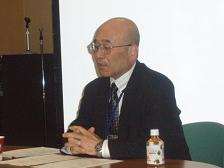
文部科学省視学官の大杉昭英氏(Akihide Ohsugi)
ワークショップ(1日目)内容要旨:
2日間にわたるワークショップ1日目は、まず最初に経済教育ネットワーク代表の篠原総一氏(同志社大)より、「この活動は、まとまりなくやられている経済教育がうまく運ぶように工夫をして、経済教育に携っている全国の先生方を支援するために、どうしたらいいか皆さんの意見をうかがって進めて行きたい」という趣旨の挨拶があった。
それに続いて最初のセッション「経済の授業内容をどう組み立てるか」では、新井明氏(都立西高)が自らの実践に基づいて、経済学の見方や考え方を教えることの重要性を指摘し、実践的な授業として「レモンをお金にかえる法」を資料として使い、参加者には「囚人のジレンマ」を応用したゲームを実際にやらせてその意義を強調した。これに対するコメントとして、猪瀬武則氏(弘前大)は、経済教育について一般的な議論の枠組みを詳しく示し、経済教育の「目標、内容、方法」をそれぞれよく考る必要があることを示した。
次のセッション「モデル授業:シミュレーション教材」では、三枝利多氏(目黒中央中)がよく知られた「牛丼屋シミュレーション」を参加者に実際にやらせて、そこから何が学べるか、またそれをどう使うかという問題提起を行なった。それに対して、藤井宏樹氏(同志社香里中高)は、シミュレーション教材から学べるものの限界と評価の難しさを指摘。その後参加者の活発な議論が続いた。
1日目の最後のセッション「教育課程と経済教育」では、大杉昭英氏(文部科学省初等中等教育局視学官)が、中学校と高校の「学習指導要領」における経済教育の取扱いについて基本的な考え方を説明した。結論部分で、経済教育を「社会科・公民科」の枠内だけでなく、学校教育全体として他の科目も含めて考えていくべきという点が強調された。
全体として、現場で経済教育を行なっている立場からの危機意識あふれた意見が目立ち、特に小中高を通じて経済教育にかかわる過程が一貫した形で教えられておらず、重複やギャップが深刻なのでその点の早急な是正が必要であるといった指摘がなされた。また経済の専門でない教員でも経済教育が行なえるように教材や研修の支援が必要で、それこそ経済教育ネットワークがやるべきことではないかという意見も出されるなど、大変示唆に富んだ意義深いワークショップの1日目であった。
ワークショップ全体のプログラム詳細は以下を参照:
http://www.econ-edu.net/modules/news2/article.php?storyid=8
Workshop (Day 1) Summary:
On the first day of the two-day workshop, Mr. Shoichi Shinohara (Doshisha Univ.) gave an introductory address by saying that "we will try to organize various efforts on economic education for supporting all teachers in this field, and would like to proceed by listening to your opinions and suggestions."
In the morning session "Economics Course Content," Mr. Akira Arai (Tokyo Nishi High) pointed out the importance of teaching economic viewpoints and approaches, and emphasized the usefulness of practical games as those in the textbook "How to Turn Lemons into Money" by actually conducting a prisoners' dilemma-type game involving the workshop participants. Mr. Takenori Inose (Hirosaki Univ.) commented on Mr. Arai's presentation by offering a comprehensive framework for discussions on economic education in general, and argued that "objectives, contents and methods" for economic education should be considered in a systematic way.
In the next session "Model Lecture: Simulation," Mr. Toshita Saegusa (Meguro Chuo Middle School) explained how to make use of the well-known "Beef Rice Bowl Shop Simulation" in class, where the workshop participants actually formed a small group to simulate the opening of a beef rice bowl shop. Mr. Hiroki Fujii (Doshisha Kori Middle/High) pointed out the limitation of such simulation and the difficulty of evaluation for economic education, leading to a lively discussion among the participants.
In the final session of the first day, "School Education and Economics," Mr. Akihide Ohsugi (Education Ministry) explained the official stance regarding economic education in the Ministry's "Course of Study," and maintained that economic education should be interpreted broadly so as to be considered in the context of overall school education.
Throughout today's sessions, the sense of crisis among those teachers who are struggling to teach economic subjects could be felt, and it was pointed out that various gaps and overlaps in economic education should be eliminated to have consistent curricula for elementary/middle/high schools. It was also suggested that the Network for Economic Education should help develop good teaching materials to support those teachers who lack necessary training for economic education. As far as the first day is concerned, the workshop seemed quite meaningful and helpful for the participants.
For a detailed program on the two-day workshop, see the following;
http://202.164.252.34/blog/2006/09/announcement.html



